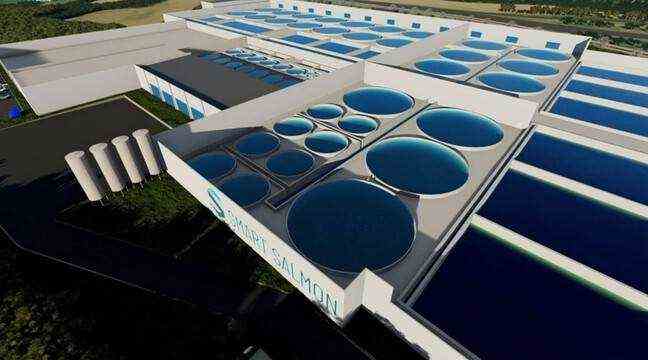The subject has been mentioned for years in the corridors of Guingamp-Paimpol Agglomeration. The community was still called Guingamp Community when it saw the company Smart Salmon knocking on its door to inquire about the purchase of land. Already installed in La Roche-Jaudy, the Norwegian fish farming company wanted to stay in the Côtes d’Armor to build its new project for a salmon farming plant. After years of discussions, the community has just given its agreement to sell its ten hectare plot in the Plouisy business park. But since this vote, voices are heard to challenge this project. Because it is massive! At the site, the Norwegian company hopes to produce 10,000 tonnes of salmon per year.
Contacted by 20 minutes, the people in charge of
Smart Salmon want to be reassuring about their project and explain their choice to set up near Guingamp. “One of the owners is already established locally [à La Roche-Jaudy, à 20 km au nord de Plouisy]. We had a good reception from the authorities and the site is close to our market and to large cities such as Paris. Most of our production will be sold in France, but also in a few neighboring countries, ”explains Petter Bakke, one of the managers of Smart Salmon. His company is planning an investment of more than 100 million euros to build its factory of around 50,000 m².
Ultimately, she hopes to employ 50 to 100 people there. A shock argument in one of the poorest areas of Brittany where the unemployment rate exceeds 9%. “Of employment, we obviously say yes, but not at any cost. We first checked that the project complied with environmental standards, the town planning code and water resources. The file was studied by the Estates, by the prefecture and by the local water commission and nothing was noted. But we are only at the stage of the sale of the land ”, tempers Claire Vidament, chief of staff of Philippe Le Goff.
“It remains a giant breeding farm disconnected from the environment”
For several months, the deputy vice-president for the economy, major projects and employment has been trying to reassure those who are worried about seeing this salmon factory land in a sector already established in intensive agriculture. “It’s aboveground breeding and that raises a lot of questions,” said Dominique Le Goux, member of
the association Water and rivers of Brittany. Opposed to the factory farm project, the activist warns. “In the imagination, salmon may have a cleaner image than pig or poultry farming. But it remains a giant breeding which will be completely disconnected from the environment. “
His association is particularly concerned about the water resource, which is already lacking in the sector. In the Trieux, the small neighboring stream, there are still some wild salmon. But they are wiped out by a still poorly identified disease. And not helped by the saturation of wastewater treatment plants which are struggling to treat the agglomeration’s wastewater. Questioned, the company Smart Salmon tries to reassure, explaining that 600 m³ of water will be needed each day but that this water will be reprocessed on site and reinjected in a closed circuit. “We will not let out any polluted water. The sludge will be reused to produce biogas which we will use to supply a giant rooftop vegetable garden ”, assures Petter Bakke. An argument that hardly convinces the association Eau et rivières. “The argument of a farm operating in a fully closed circuit is a myth, the organic and medicinal discharges produced will have to be treated somewhere”, assures Dominique Le Goux.
To gain access to this already precious water, the Smart Salmon company is considering either tapping into the network, or digging a supply well, or a combination of the two. And it intends to move quickly and displays its ambition to start salmon farming by 2023. It will first go through a long process of consultation and a public inquiry. “The time for expression will come”, explains the chief of staff of Guingamp Paimpol Agglomeration.

